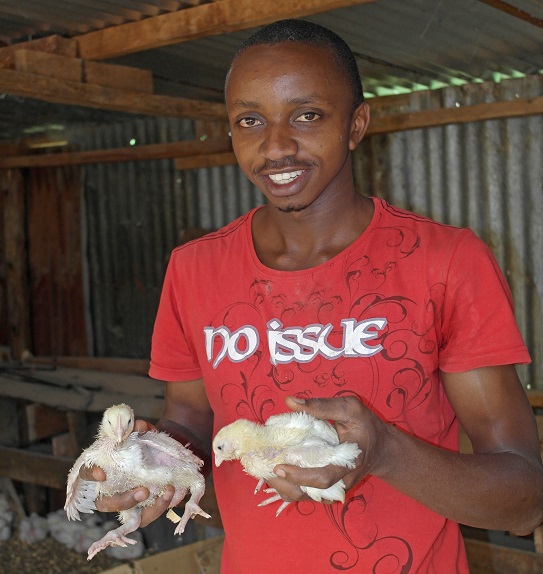-
About
- Our Work
- Get Involved
- Stay Updated

An increasing proportion of the African children are completing primary school as compared to Fifty years ago (70% in 2011), and as they transition into young adulthood, most still face the challenges of unemployment and underemployment aggravated by their lack of relevant skills, education and limited access to land and capital to start their own enterprises.
As a young man who grew up in a village in Kenya and brought up within a farming family setup, the issues to deal with food security, food production and food loss has been of key importance and at the bottom of my heart. My parents always taught me the art of food production within a subsistence setup which encouraged me to pursue it more at a higher commercial level. This was later on promoted by my exposure within the higher learning institutions where I travelled to different parts of the world and interacted with young people who have employed themselves and others by doing farming commercially.
Facts have it that more than 11 million young people in Africa join the labour markets every year with only a quarter of them finding decent employment.59% of (20-24)years old will complete secondary education by 2030 compared to the current 42% which translates to 137 million youth with secondary education and 12million with tertiary education. Yet, currently more than 70% of the youth live on less than 2 USD every day and it is expected to be worse if unemployment rates are not checked. This presents a huge opportunity for governments to tackle the issue of low productivity within the agricultural sector which can be the solution to the youth bulge problem by creating an enabling environment for young people to want to engage in agriculture through making access to finance possible without collateral such as a title deed, embracing technological innovations and scaling them up, capacity building as well as markets and financial inclusion.
However, if Africa is to sustainably increase the productivity of its agriculture sector, it must find appropriate and effective ways to harness the continents unprecedented ‘Youth dividend.’ Agriculture offers the youth the opportunity for improved livelihoods and employment but for agriculture to be attractive to them it must be profitable, competitive and dynamic. They must also be included in decision making processes especially with respect to resolving policy constraints to youth involvement in Agriculture.
Being a successful young farmer with a dairy and poultry farm I have come to understand the role that agriculture plays within a country’s economy and further to addressing the needs of a community specifically the young people. As we prepare for GCARD, I believe my participation will not only support me in my farming enterprise but also help me empower more young people that I work with in my daily work as a young expert on youth in Agribusiness.
An economist by study, a lover of agriculture and passionate about youth empowerment and currently working as the youth in agribusiness program coordinator for AriProFocus East Africa, I hope to be able to learn as much as possible. I have a lot of facilitation skills, report writing as well as moderation of activities in a conference setting.
This blog post is part of the GCARD3 Youth blogpost applications. The content, structure and grammar is at the discretion of the author only.
Tags:About the author
Author's recent posts
More posts from authorRelated Posts
Comments
No comments made yet. Be the first to submit a commentBy accepting you will be accessing a service provided by a third-party external to https://ypard.net/
Get in touch
Email: [email protected]
YPARD Global Coordination UnitHosted by AGRIDEA and the Czech University of Life Sciences Prague
Lausanne, Switzerland and Prague, Czech Republic - Our Work


